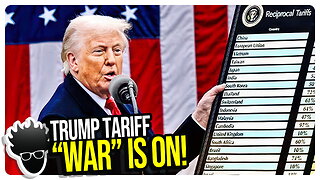Premium Only Content

Worldly Peace or Heavenly Peace?
As I initiate gospel conversations with a wide variety of people in public places, naturally some go better than others. Almost always the conversations that don’t go well are not because the person I talk with totally disagrees with me, but rather those that are with people who just don’t care much about eternity or spiritual things.
That was the case with a man from China whose American name is Winston. He described himself as worldly, with no interest or belief in anything beyond this life. At the same time he was careful to say he respects the belief of those who do, no matter what religion they might belong to. Winston seemed to have a general understanding of Christianity, that “Jesus died for our sins”, but without belief in God and with judging himself to be a good person by his own standards, this didn’t really mean much to him.
Toward the end of our conversation, however, Winston expressed the view that many wars have been fought in the name of religion. I had to agree, and my initial reaction was to defend true Christianity as peaceful and Jesus as a man of peace. But is that true?
Does every reminder of wars fought in the name of Christianity have to be an automatic justification for those who want to reject Christianity as hypocritical and untrue? Does fighting for our faith and for Christian values automatically disqualify our witness as Christians?
After all, Jesus said “Blessed are the peacemakers, for they will be called children of God.” He often told people he healed or who experienced forgiveness “Go in peace”. He calmed down his disciples by telling them “Peace be with you”, and he was greeted on the night he was born by angels proclaiming “peace to those on whom his favor rests”. In Isaiah we read that he is the “Prince of Peace” and “Of the greatness of his government and peace there will be no end.”
But do all these references to “peace” automatically mean we are not to fight for anything? What kind of peace was Jesus referring to and when does he intend it to occur? That passage about peace in Isaiah clearly referred to his government, prophesied to occur during the end times. The peace he gave to those he forgave or healed seemed to refer to an end to guilt or pain, and the peace he gave to his disciples seemed to be words of assurance in the face of adversity: “I have told you these things, so that in me you may have peace. In this world you will have trouble. But take heart! I have overcome the world.”
Maybe we conveniently forget that Jesus also said “Do not suppose that I have come to bring peace to the earth. I did not come to bring peace, but a sword."
This he said in Matthew 10, where he was instructing his disciples about the difficulties of persecution and spiritual warfare. He told them - and I believe he also tells any of us who want to follow him – “Whoever does not take up their cross and follow me is not worthy of me. Whoever finds their life will lose it, and whoever loses their life for my sake will find it.”
On the night before his violent and torturous crucifixion, Jesus told his disciples “Peace I leave with you; my peace I give you. I do not give to you as the world gives…” I believe this means that the “peace” Jesus offers is not like the “peace” the world offers. The world seems to offer peace by running away from conflict, by glossing over differences, by pretending everything is okay. Jesus offers His peace while we are running into battle, while we are taking a stand, and while we are working, maybe even fighting, to be peacemakers.
I started to tell Winston that Jesus was a man of peace, but then some of these verses came to mind. I began to feel dishonest or at least hypocritical, so instead I explained that Jesus gives us something to live for and something worth dying for. I asked Winston if there was anything he thought was worth dying for, and he said that as a citizen he should be willing to die for his country. I explained that countries really are only temporary, but that a greater cause would be to give one’s life for God and His glory. Sometimes that will mean dying in service to one’s country, or to defend one’s family, or in service to Christ.
Do the many religious wars negate the validity of the Gospel? Many faithful Christians have died for their faith and in service to God in many ways. Looking back from the larger picture of history it may seem many died in vain or for causes we now judge to be unworthy, or at least mistaken.
But before we judge, let’s ask ourselves, what will we die for? What are we even living for? The peace Jesus offers is not the worldly peace that comes from disinterest in the things of heaven like Winston has, but peace in the midst of living and sometimes fighting for the glory of God and laying down our lives like Jesus did.
-
 LIVE
LIVE
vivafrei
3 hours agoModerating Debate on Syria - Roy Gutman vs. Scott Horton - Regime Change Good or Bad?
10,585 watching -
 LIVE
LIVE
Donald Trump Jr.
2 hours agoNew Era of Fair Trade Plus Interview with Brett Favre | TRIGGERED Ep.230
17,072 watching -
 58:07
58:07
BonginoReport
2 hours agoThe Biden Crime Family Isn’t Above The Law! (Ep. 19) - Nightly Scroll w/ Hayley Caronia - 04/03/25
13.1K16 -
 1:32:07
1:32:07
Kim Iversen
4 hours agoMAHA Doctors Are Being SILENCED! How State Laws Are Bypassing Trump's Health Agenda
55.4K16 -
 LIVE
LIVE
LFA TV
7 hours agoTrump Unites the World Against America | TRUMPET DAILY 4.3.25 7PM
253 watching -
 2:00:11
2:00:11
Redacted News
3 hours agoMELTDOWN! Trump’s Tariffs causing outrage on both sides, gold surges, markets meltdown | Redacted
83.8K39 -
 22:46
22:46
JasminLaine
2 hours agoDid Carney Just CONFIRM It’s RIGGED? Poilievre WRECKS Reporter ON AIR
1.24K9 -
 12:48
12:48
Tactical Considerations
2 hours agoM&P Carry Comp.. Almost Perfect Or Is It?
1.57K2 -
 1:41:13
1:41:13
vivafrei
6 hours agoTrump Tariff War IS ON! Canada's Political Prisoners Sentenced! Eric Adams Runs as independent?
64.7K26 -
 43:43
43:43
Kimberly Guilfoyle
5 hours agoThe Global Gravy Train is Over, Live with Elizabeth Pipko & Rob Bluey | Ep210
54.9K20